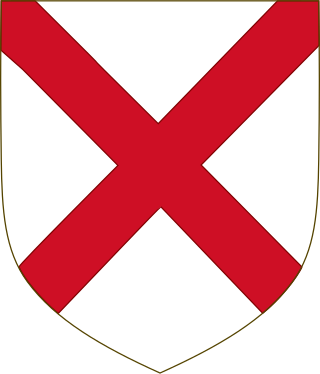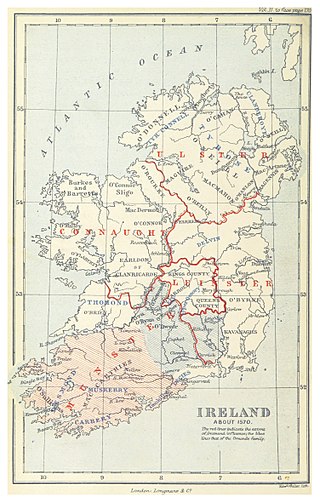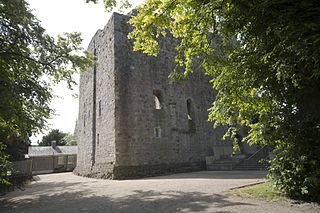| |||||
| Centuries: | |||||
|---|---|---|---|---|---|
| Decades: | |||||
| See also: | Other events of 1487 List of years in Ireland | ||||
Events from the year 1487 in Ireland.
| |||||
| Centuries: | |||||
|---|---|---|---|---|---|
| Decades: | |||||
| See also: | Other events of 1487 List of years in Ireland | ||||
Events from the year 1487 in Ireland.

Duke of Leinster is a title in the Peerage of Ireland and the premier dukedom in that peerage. The subsidiary titles of the Duke of Leinster are: Marquess of Kildare (1761), Earl of Kildare (1316), Earl of Offaly (1761), Viscount Leinster, of Taplow in the County of Buckingham (1747), Baron of Offaly, Baron Offaly (1620) and Baron Kildare, of Kildare in the County of Kildare (1870). The viscounty of Leinster is in the Peerage of Great Britain, the barony of Kildare in the Peerage of the United Kingdom, and all other titles in the Peerage of Ireland. The courtesy title of the eldest son and heir of the Duke of Leinster is Marquess of Kildare. The Duke of Leinster is the head of the House of Kildare.

Earl of Desmond is a title in the peerage of Ireland which has been created four times since 1329. The title was first awarded to Maurice FitzGerald, 4th Baron Desmond, a Hiberno-Norman lord in Southwest Ireland, and it was held by his descendants until 1583 when they rose against the English crown in the Desmond Rebellions. Following two short-lived recreations of the title in the early 1600s, the title has been held since 1628 by the Feilding family of Warwickshire, England. The current holder is Alexander Feilding, 12th Earl of Denbigh and 11th Earl of Desmond.

Lieutenant-General James FitzGerald, 1st Duke of Leinster, PC (Ire), styled Lord Offaly until 1743 and known as The Earl of Kildare between 1743 and 1761 and as The Marquess of Kildare between 1761 and 1766, was an Anglo-Irish nobleman, soldier and politician.

The FitzGerald dynasty is a noble and aristocratic dynasty of Cambro-Norman and Anglo-Norman origin. They have been peers of Ireland since at least the 13th century, and are described in the Annals of the Four Masters as having become "more Irish than the Irish themselves" or Gaels, due to assimilation with the native Gaelic aristocratic and popular culture. The dynasty has also been referred to as the Geraldines and Ireland's largest landowners. They achieved power through the conquest of large swathes of Irish territory by the sons and grandsons of Gerald de Windsor. Gerald de Windsor was the first Castellan of Pembroke Castle in Wales, and became the male progenitor of the FitzMaurice and FitzGerald Dynasty. His father, Baron Walter FitzOther, was the first Constable and Governor of Windsor Castle for William the Conqueror, and was the Lord of 38 manors in England, making the FitzGeralds one of the "service families" on whom the King relied for his survival.
The Lord Deputy was the representative of the monarch and head of the Irish executive under English rule, during the Lordship of Ireland and then the Kingdom of Ireland. He deputised prior to 1523 for the Viceroy of Ireland. The plural form is Lords Deputy.

The Desmond Rebellions occurred in 1569–1573 and 1579–1583 in the Irish province of Munster. They were rebellions by the Earl of Desmond, the head of the FitzGerald dynasty in Munster, and his followers, the Geraldines and their allies, against the threat of the extension of the English government over the province. The rebellions were motivated primarily by the desire to maintain the independence of feudal lords from their monarch but also had an element of religious antagonism between Catholic Geraldines and the Protestant English state. They culminated in the destruction of the Desmond dynasty and the plantation or colonisation of Munster with English Protestant settlers. 'Desmond' is the Anglicisation of the Irish Deasmumhain, meaning 'South Munster'.

Gerald FitzGerald, 14th Earl of Desmond, also counted as 15th or 16th, owned large part of the Irish province of Munster. In 1565 he fought the private Battle of Affane against his neighbours, the Butlers. After this, he was for some time detained in the Tower of London. Though the First Desmond Rebellion took place in his absence, he led the Second Desmond Rebellion from 1579 to his death and was therefore called the Rebel Earl. He was attainted in 1582 and went into hiding but was hunted down and killed.
James FitzGerald or James Fitzgerald may refer to:

Gerald FitzMaurice FitzGerald (1335–1398), also known by the Irish Gaelic Gearóid Iarla, was the 3rd Earl of Desmond, in southwestern Ireland, under the first creation of that title, and a member of the Anglo-Norman dynasty of the FitzGerald, or Geraldines. He was the son of Maurice FitzGerald, 1st Earl of Desmond, by his third wife Aveline (Eleanor), daughter of Nicholas FitzMaurice, 3rd Lord of Kerry. He was half-brother to Maurice FitzGerald, 2nd Earl of Desmond.

Gerald FitzGerald, 11th Earl of Kildare, also known as the "Wizard Earl", was an Irish peer. He was the son of Gerald FitzGerald, 9th Earl of Kildare and his second wife Elizabeth Grey of the Royal House of Grey.
Events from the year 1513 in Ireland.
Events from the year 1491 in Ireland.
Events from the year 1534 in Ireland.
Events from the year 1585 in Ireland.
Events from the year 1525 in Ireland.

Thomas FitzJohn FitzGerald, 7th Earl of Kildare, was an Irish peer and statesman of the fifteenth century who held the office of Lord Chancellor of Ireland.

James FitzGerald, 6th Earl of Desmond, called 'the Usurper', was a younger son of Gerald FitzGerald, 3rd Earl of Desmond, and Lady Eleanor, daughter of James Butler, 2nd Earl of Ormond.

Thomas FitzJames FitzGerald, 7th Earl of Desmond, called 'Thomas of Drogheda', and also known as the Great Earl, was the son of James FitzGerald, 6th Earl of Desmond and Mary de Burgh. He was Lord Deputy of Ireland under the Lieutenancy of Duke of Clarence from 1463 to his death, and in 1464 founded the College of Youghal. His plan to found a University at Drogheda failed due to his judicial assassination.

Gerald FitzGerald, 8th Earl of Kildare KG, known variously as "Garret the Great" or "The Great Earl", was Ireland's premier peer. He served as Lord Deputy of Ireland from 1477 to 1494, and from 1496 onward. His power was so great that he was called "the uncrowned King of Ireland".
Events from the year 1529 in Ireland.